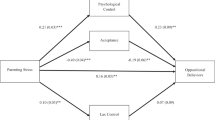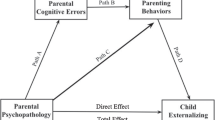Abstract
The field of research associated with this study is clinical psychology; specifically, the focus is on parenting, emerging adulthood, and disruptive behavior. Research indicates that ineffective parenting practices are associated with disruptive behavior in offspring and disruptive behavior in offspring affects parenting practices. However, this relationship is not studied in emerging adulthood. Thus, we examined the relationship between parenting and disruptive behavior in a sample of emerging adults. It was hypothesized that rule-breaking behavior would have a stronger impact on parenting than aggressive behavior and ADHD problems, and parental psychopathology would mediate the relationship between disruptive behavior and parenting. Participants were 484 college students age 18–24 years. Current perceptions of mothers and fathers were measured separately via an online survey using the Parental Authority Questionnaire, Parental Environment Questionnaire, Conflict Tactics Scale: Parent–Child Version, and the Adult Self-Report/Adult Behavior Checklist. As hypothesized, ADHD had no association with parenting or discipline practices. Rule-breaking behavior in sons and daughters was associated more highly with maternal effective parenting and harsh discipline than aggressive behavior and ADHD problems. For fathers, rule-breaking behavior in sons was associated more highly with paternal effective parenting than aggressive behavior or ADHD problems. Mediation by parental psychopathology was largely supported for mothers and fathers and moderation by participant gender was found in some cases. Regarding clinical significance, parents of emerging adults with disruptive behavior may experience distress influencing their ability to parent effectively. It may be suggested that parents of emerging adults seek methods to learn to parent more effectively.


Similar content being viewed by others
References
Achenbach, T. M., & Rescorla, L. A. (2003). Manual for the ASEBA adult forms and profiles. Burlington, VT: University of Vermont, Research Center for Children, Youth, & Families.
American Psychiatric Association. (2013). Diagnostic and statistical manual of mental disorders (5th ed.). Arlington, VA: American Psychiatric Publishing.
Anderson, J. C., & Gerbing, D. W. (1988). Structural equations modeling in practice: A review and recommended two-step approach. Psychological Bulletin, 103, 411–423.
Arnett, J. J. (2000). Emerging adulthood: A theory of development from the late teens through the twenties. American Psychologist, 55, 469–480.
Baron, R. M., & Kenny, D. A. (1986). The moderator-mediator variable distinction in social psychological research: Conceptual, strategic, and statistical considerations. Journal of Personality and Social Psychology, 51, 1173–1182.
Barry, T., Dunlap, S., Cotton, S., Lochman, J., & Wells, K. (2005). The influence of maternal stress and distress on disruptive behavior problems in boys. Journal of the American Academy of Child and Adolescent Psychiatry, 44, 265–273.
Barry, B., & Stewart, G. L. (1997). Composition, process, and performance in self-managed groups: The role of personality. Journal of Applied Psychology, 82, 62–78.
Bem, S. L. (1974). The measurement of psychological androgyny. Journal of Consulting and Clinical Psychology, 42, 155–162.
Buri, J. R. (1991). Parental Authority Questionnaire. Journal of Personality Assessment, 57, 110–119.
Burke, J. D., Pardini, D., & Loeber, R. (2008). Reciprocal relationship between parenting behavior and disruptive psychopathology from childhood through adolescence. Journal of Abnormal Child Psychology, 36, 679–692.
Burke, J. D., Rowe, R., & Boylan, K. (2014). Functional outcomes of child and adolescent oppositional defiant disorder symptoms in young adult men. Journal of Child Psychology and Psychiatry, 55, 264–272.
Chronis-Tuscano, A., Clarke, T., O’Brien, K., Raggi, V., Diaz, Y., Mintz, A., et al. (2013). Development and preliminary evaluation of an integrated treatment targeting parenting and depressive symptoms in mothers of children with attention-deficit/hyperactivity disorder. Journal of Consulting and Clinical Psychology, 81, 918–925.
Connor, D., & Doerfler, L. (2008). ADHD with comorbid oppositional defiant disorder or conduct disorder: Discrete or nondistinct disruptive behavior disorders? Journal of Attention Disorders, 12, 126–134.
Deault, L. (2010). A systematic review of parenting in relation to the development of comorbidities and functional impairments in children with attention-deficit/hyperactivity disorder (ADHD). Child Psychiatry and Human Development, 41, 168–192.
Edwards, G., Barkley, R., Laneri, M., Fletcher, K., & Metevia, L. (2001). Parent-adolescent conflict in teenagers with ADHD and ODD. Journal of Abnormal Child Psychology, 29, 557–572.
Elkins, I., McGue, M., & Iacono, W. (1997). Genetic and environmental influences on parent-son relationships: Evidence for increasing genetic influence during adolescence. Developmental Psychology, 33, 351–363.
Finley, G., Mira, S., & Schwartz, S. (2008). Perceived paternal and maternal involvement: Factor structures, mean differences, and parental roles. Fathering, 6, 62–82.
Fite, P., Colder, C., Lochman, J., & Wells, K. (2006). The mutual influence of parenting and boys’ externalizing behavior problems. Journal of Applied Developmental Psychology, 27, 151–164.
Gonzalez, A., Greenwood, G., & WenHsu, J. (2001). Undergraduate students’ goal orientations and their relationship to perceived parenting styles. College Student Journal, 35, 182–192.
Gross, H., Shaw, D., Moilanen, K., Dishion, T., & Wilson, M. (2008). Reciprocal models of child behavior and depressive symptoms in mothers and fathers in a sample of children at risk for early conduct problems. Journal of Family Psychology, 22, 742–751.
Hayes, A. F. (2009). Beyond Baron and Kenny: Statistical mediation analysis in the new millennium. Communication Monographs, 76, 408–420.
Hu, L., & Bentler, P. M. (1999). Cutoff criteria for fit indexes in covariance structure analysis: Conventional criteria versus new alternatives. Structural Equation Modeling, 6, 1–55.
Huh, D., Tristan, J., Wade, E., & Stice, E. (2006). Does problem behavior elicit poor parenting? A prospective study of adolescent girls. Journal of Adolescent Research, 21, 185–204.
James, L. R., Mulaik, S. A., & Brett, J. M. (1982). Causal analysis: Assumptions, models, and data. Beverly Hills, CA: Sage Publications.
Klein, H., O’Bryant, K., & Hopkins, H. (1996). Recalled parental authority style and self-perception in college men and women. The Journal of Genetic Psychology: Research and Theory on Human Development, 157, 5–17.
Kline, R. B. (2011). Principles and practice of structural equation modeling (3rd ed.). New York, NY: The Guilford Press.
Latimer, K., Wilson, P., Kemp, J., Thompson, L., Sim, F., Gillberg, C., et al. (2012). Disruptive behaviour disorders: A systematic review of environmental antenatal and early years risk factors. Child: Care, Health and Development, 38, 611–628.
Leadbetter, B., Thompson, K., & Gruppuso, V. (2012). Co-ocurring trajectories of symptoms of anxiety, depression, and oppositional defiance from adolescence to young adulthood. Journal of Clinical Child and Adolescent Psychology, 41, 719–730.
Loeber, R., Burke, J., & Pardini, D. (2009). Perspectives on oppositional defiant disorder, conduct disorder, and psychopathic features. The Journal of Child Psychology and Psychiatry, 50, 133–142.
MacKinnon, D. P. (2008). Introduction to statistical mediation analysis. Mahwah, NJ: Erlbaum.
McKinney, C., Donnelly, R., & Renk, K. (2008). Perceived parenting, positive and negative perceptions of parents, and late adolescent emotional adjustment. Child and Adolescent Mental Health, 13, 66–73.
McKinney, C., Milone, M. C., & Renk, K. (2011). Parenting and late adolescent emotional adjustment: Mediating effects of discipline and gender. Child Psychiatry and Human Development, 42, 463–481.
McKinney, C., & Renk, K. (2008a). Differential parenting between mothers and fathers. Journal of Family Issues, 29, 806–827.
McKinney, C., & Renk, K. (2008b). Multivariate models of parent-late adolescent gender dyads: The importance of parenting process in predicting adjustment. Child Psychiatry and Human Development, 39, 147–170.
McKinney, C., & Renk, K. (2011). A multivariate model of parent-adolescent relationship variables in early adolescence. Child Psychiatry and Human Development, 42, 442–462.
Nelson, L., Padilla-Walker, L., Christensen, K., Evans, C., & Carroll, J. (2011). Parenting in emerging adulthood: An examination of parenting clusters and correlates. Journal of Youth and Adolescence, 40, 730–743.
Pfiffner, L., McBurnett, K., Rathouz, P., & Judice, S. (2005). Family correlates of oppositional and conduct disorders in children with attention deficit/hyperactivity disorder. Journal of Abnormal Child Psychology, 33, 551–563.
Rescorla, L., & Achenbach, T. (2004). The achenbach system of empirically based assessment (ASEBA) for ages 18 to 90 years. The use of psychological testing for treatment planning and outcomes assessment: Volume 3: Instruments for adults (3rd ed., pp. 115–152). Mahwah, NJ: Lawrence Erlbaum Associates Publishers.
Rhee, S. H., Willcutt, E. G., Hartman, C. A., Pennington, B. F., & DeFries, J. C. (2008). Test of alternative hypotheses explaining the comorbidity between attention-deficit/hyperactivity disorder and conduct disorder. Journal of Abnormal Child Psychology, 36, 29–40.
Rucker, D. D., Preacher, K. J., Tormala, Z. L., & Petty, R. E. (2011). Mediation analysis in social psychology: Current practices and new recommendations. Social and Personality Psychology Compass, 5(6), 359–371.
Stormshak, E., Bierman, K., McMahon, R., & Lengua, L. (2000). Parenting practices and child disruptive behavior problems in early elementary school. Journal of Clinical Child Psychology, 29, 17–29.
Straus, M. A., Hamby, S. L., Finkelhor, D., Moore, D. W., & Runyan, D. (1998). Identification of child maltreatment with the parent-child conflict tactics scales: Development and psychometric data for a national sample of American parents. Child Abuse and Neglect, 22, 249–270.
Wintre, M., & Sugar, L. (2000). Relationships with parents, personality, and the university transition. Journal of College Student Development, 41, 202–214.
Yahav, R. (2007). The relationship between children’s and adolescent’s perceptions of parenting style and internal and external symptoms. Child: Care, Health and Development, 33, 460–471.
Author information
Authors and Affiliations
Corresponding author
Rights and permissions
About this article
Cite this article
McClelland, E., McKinney, C. Disruptive Behavior and Parenting in Emerging Adulthood: Mediational Effect of Parental Psychopathology. J Child Fam Stud 25, 212–223 (2016). https://doi.org/10.1007/s10826-015-0205-8
Published:
Issue Date:
DOI: https://doi.org/10.1007/s10826-015-0205-8




